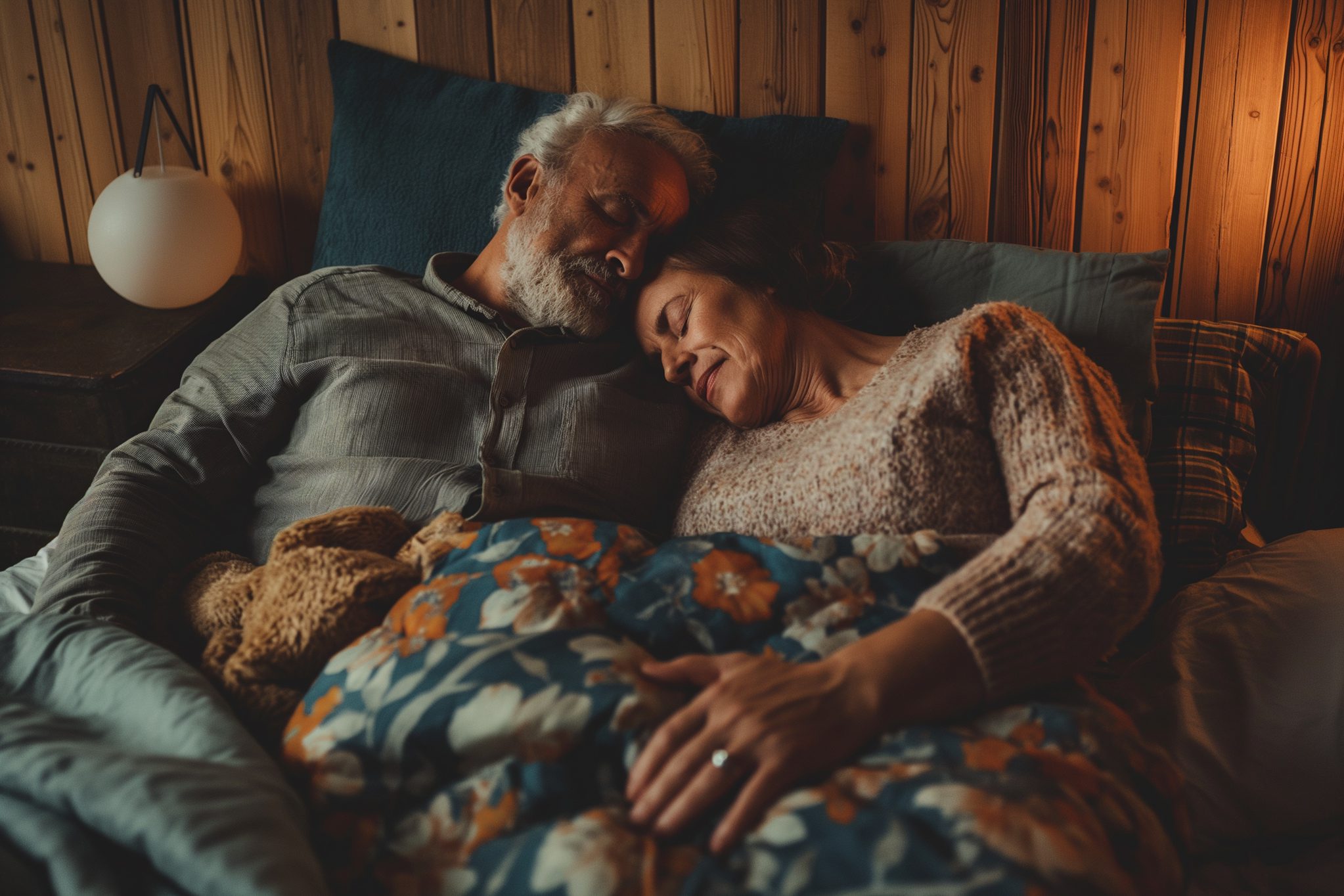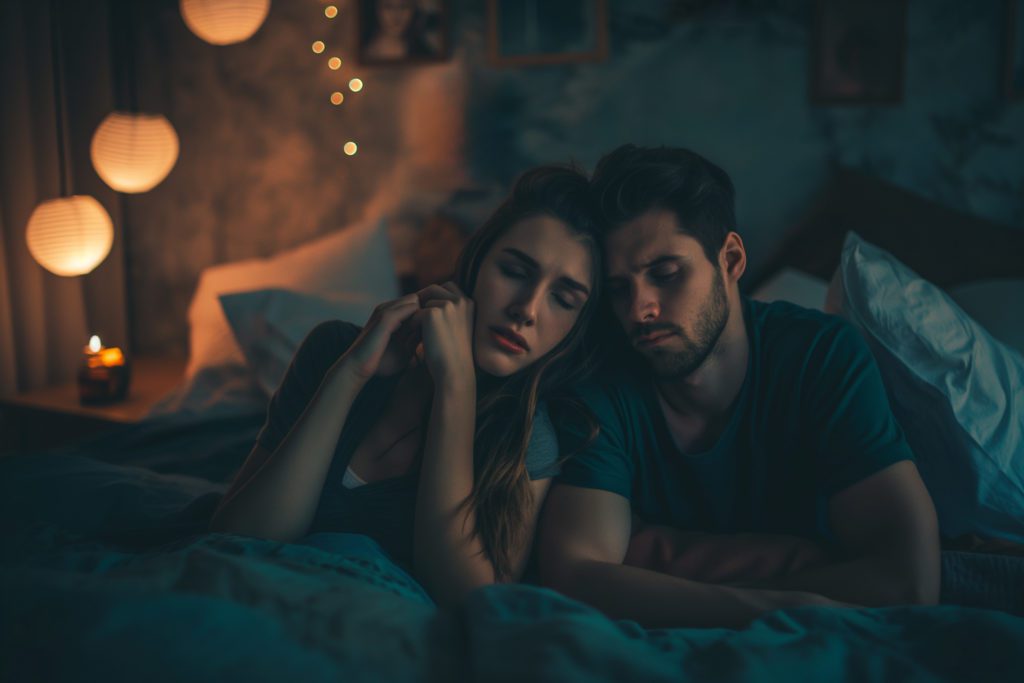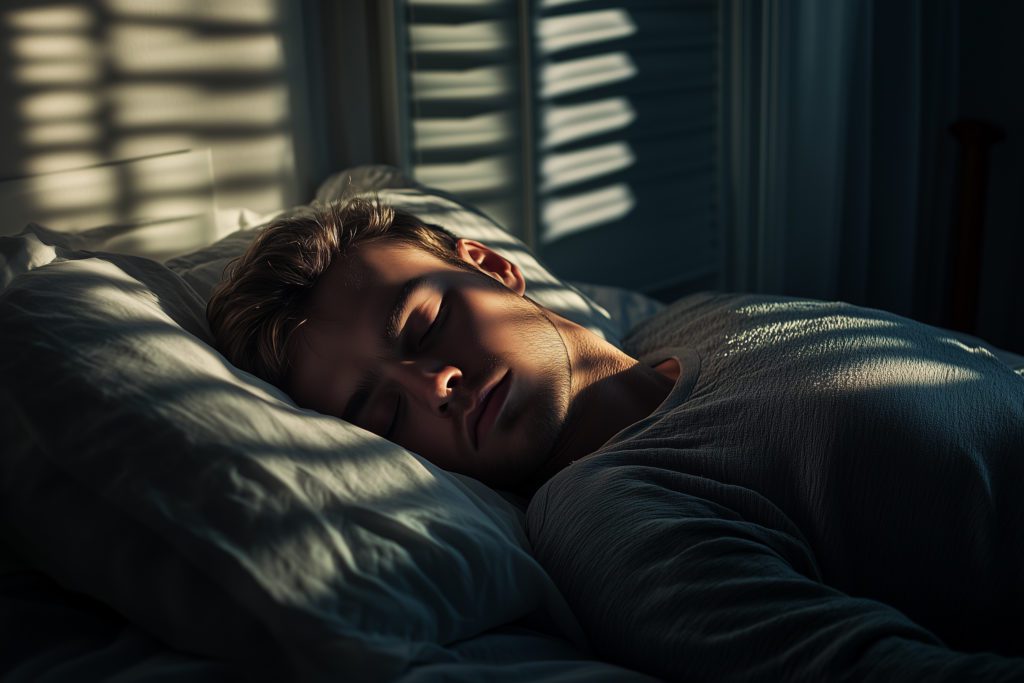
Psychological Effects of Sleep Deprivation on Sexual Health
When you are sleep-deprived, it can impact your sexual health. Sleep deprivation can lead to psychological effects associated with reduced libido.

One in 10 adults suffer from chronic insomnia or have difficulty falling or staying asleep throughout the night. When you consistently sleep too little, it can lead to a number of consequences.
We know that sleep is vital to overall well-being and health. Not getting enough sleep can cause plenty of problems in your day-to-day life, including in your sexual life. After all, how often do you wake up from a bad night's sleep and want to have sex? Probably not that much.
Let’s take a closer look at the effects of sleep deprivation on sexual health.
The Connection Between Sleep and Sex
The average adult needs between seven to nine hours of sleep a night. With the intense pressure in our society to get more done in the space of a day, many people try to get away with far less sleep than this. But, doing so can ruin your sex life.
The loss of just one hour of sleep a night can seriously affect sexual desire. In the Women’s Health Initiative Study, women who slept for less than seven hours a night were much less likely to be sexually satisfied compared to women who slept for 8 hours or more a night.
When you are tired, it makes it much less likely that you will want to have sex. Longer sleep duration is linked to greater sexual desire. In one study, participants who got one hour more of sleep a night were 14 percent more likely to want to have sex than those who did not get the extra sleep.
The Psychological Effects of Poor Sleep and How They Affect Sex
The psychological effects of poor sleep can negatively impact sexual health in many ways. Insomnia greatly increases the risk of depression. People who suffer from sleep deprivation have a tenfold higher risk of developing depression compared to those who sleep well. Depression, in turn, can lead to erectile and sexual dysfunction. In fact, depression and sexual problems go hand-in-hand. Men who have depression are more likely to experience erectile dysfunction.
A lack of sleep also raises levels of the “stress” hormone cortisol in your body. Studies have consistently shown that when you don’t get enough sleep, it raises levels of this hormone. When your cortisol levels are high, it negatively impacts your sex drive.
When you don’t sleep well, it can affect your relationship. Surprisingly, sleep is paramount to relationships. When you are sleep-deprived, it can cause more conflict and less satisfaction in your relationship. That’s because when you are tired, you are more likely to be irritable and overreact to little things. This can lead to more conflict with your partner and less sex.
Sleep disorders can also impact sex drive. Studies have found that men who have obstructive sleep apnea (OSA) have higher rates of erectile dysfunction. Sleep apnea has also been linked with a loss of libido in women. The loss of libido in OSA may also be due to psychological factors. People with OSA have higher rates of depression, which could also help explain the lowered sex drive.
What To Do About Sleep Deprivation
Cutting out that third coffee of the day, staying off Instagram late at night, and relaxing more can all help you improve your sleep quality and thus enhance your sex life. Here are some other tips.
Practice Good Sleep Hygiene
Good sleep hygiene can help you get a better night’s sleep. Here are some ways to improve sleep hygiene:
- Come up with a bedtime ritual - A consistent routine can signal to the brain that it’s time for bed. In time, this will trigger your sleep-wake cycle that it’s time to sleep. Base your routine on your specific preferences. You can try a restorative bedtime yoga routine, a cup of chamomile tea, a warm bath, or wind down with a book.
- Skip the nightcap - A glass of bourbon right before bed can be a tempting way to unwind and relax after a stressful day. But, evening nightcaps do more harm than good when it comes to your sleep. Alcohol interferes with your REM sleep and it damages the overall quality of your sleep.
- Follow a schedule - Sleep experts recommend sticking to a consistent bedtime and wake-up time. It helps your internal 24-hour clock or circadian rhythm operate more efficiently. Use Pillow to monitor your sleep.
- Lower your thermostat - One thing that could be impacting your sleep that’s an easy fix is the temperature of your room. The ideal sleeping temperature is between 68 and 77 °F. If your room is too warm, this can make it hard to sleep. If you don’t have air conditioning, try using a fan in your bedroom, putting your sheets in the freezer to cool down, or taking a cool shower before bed.
- Write down your worries in a journal - Racing thoughts and anxiety can disrupt your entire night. It can help to write down your worries before you go to bed. That way, you won’t ruminate on them. When you are less worried, you are more likely to sleep better and have a better sex life too.
Talk to Your Healthcare Provider
Sleep disorders like sleep apnea can impact sexual functioning. Therefore, it’s important to see your healthcare provider if you consistently have trouble getting enough sleep or feel excessively sleepy during the daytime. Diagnosing and treating sleep disorders may help improve your sex life.
Consider Cognitive Behavioral Therapy for Insomnia (CBT-I)
For long-term insomnia, CBT-I may be helpful. This intervention is one of the most effective for insomnia. Studies have shown that CBT-I is more effective than sleep medications in the long term. More than 80 percent of people who try CBT-I see improvements in sleep quality.
CBT-I helps you overcome sleep problems by identifying negative beliefs that contribute to sleep problems and replacing them with sleep-promoting thoughts and behaviors.
Final Thoughts: Sleep Deprivation and Sexual Health
Can sleep deprivation cause sexual health problems? Yes. The psychological impact of a lack of sleep can negatively affect your relationship and sex life. Sleep disorders also play a role in sexual functioning.
There are many ways you can manage sleep deprivation. See your doctor if you have prolonged periods of not sleeping. Make sure you practice good sleep hygiene and consider therapy for insomnia.
FAQ
Can improving sleep quality enhance sexual satisfaction?
Yes, improving sleep quality can boost sexual satisfaction by increasing energy levels, enhancing mood, and balancing hormones like testosterone and estrogen. Well-rested individuals report higher libido and better overall performance, which contributes to a more fulfilling and enjoyable sex life.
Are certain sleep disorders more likely to cause sexual dysfunction?
Yes, sleep disorders such as obstructive sleep apnea (OSA), insomnia, and restless leg syndrome are commonly linked to sexual dysfunction. These conditions can lower testosterone, cause fatigue, and increase stress, leading to decreased libido, erectile dysfunction in men, and arousal difficulties in women.
Can treating sleep disorders improve sexual health?
Yes, treating sleep disorders can significantly enhance sexual health. For example, using CPAP therapy for sleep apnea can restore normal testosterone levels and improve erectile function in men. In women, addressing insomnia and sleep quality issues can help regulate hormones, leading to increased libido and intimacy.
How does sleep deprivation influence relationship satisfaction?
Poor sleep can cause irritability, mood swings, and decreased emotional connection, leading to more arguments and less intimacy in relationships. Sleep-deprived couples often experience lower relationship satisfaction due to fatigue and lack of energy, which can reduce their ability to engage in meaningful physical and emotional connections.
Does the timing of sleep affect sexual health?
Yes, irregular sleep patterns, such as those caused by shift work or inconsistent sleep schedules, can disrupt circadian rhythms and hormone production. This imbalance can reduce libido, impair arousal, and negatively impact sexual performance by causing physical fatigue and mental exhaustion.
Can sleep deprivation lead to sexual side effects from medications?
Yes, sleep deprivation can worsen the sexual side effects of medications, especially antidepressants, anti-anxiety drugs, and sleep aids. Fatigue and hormonal imbalances caused by poor sleep can amplify issues such as reduced libido, difficulty achieving arousal, and delayed orgasm in both men and women.
Are younger people less affected by sleep deprivation in terms of sexual health?
Younger individuals may be more resilient to short-term sleep deprivation, but chronic lack of sleep still affects their hormonal balance, mood, and overall energy levels. Over time, even young people can experience declines in sexual desire, arousal issues, and relationship strain due to insufficient sleep.
Can exercise help offset the negative impact of sleep deprivation on sexual health
Regular physical activity can help mitigate some effects of sleep deprivation by boosting endorphins, improving blood flow, and enhancing energy levels. Exercise can also aid in stress reduction, which may counteract some of the negative effects of poor sleep on libido and performance.

Written by
Emily Mendez
Emily Mendez is a former therapist and mental health author. She is one of the leading voices in mental health. Emily's writing has appeared in eCounseling, SonderMind, and more. Emily is frequently interviewed by Healthline, Fatherly, INSIDER, Family Circle, and other national media for her advice and expert opinion on the latest mental health topics.
Download Pillow
Get help
Press & News
Legal
Connect
X (Twitter)
Company
Copyright © Neybox Digital Ltd.



